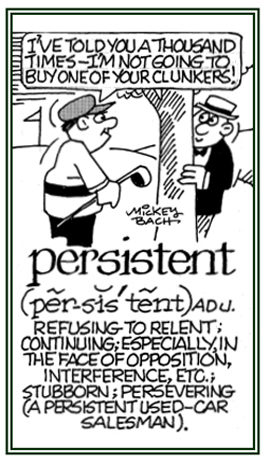stato-, stat-, sta-, -static, -stasi, staso-, -stasis, -stasia, -stacy, -stitute, -stitution, -sist
(Latin: standing, to stay, to make firm, fixed; cause to stand, to put, to place, to put in place, to remain in place; to stand still)
1. A person who supplants or forces out someone else: Mr. Simmons was accused of being the ouster when the chairman of the committee was expelled from office.
2. The act of removing or forcing somebody out of a place or a position: The army general was involved in the ouster of the head of the country's government.
3. The expulsion or removal from a position or place being occupied by someone: The opposition party called for the ouster of the cabinet minister.
2. The act of removing or forcing somebody out of a place or a position: The army general was involved in the ouster of the head of the country's government.
3. The expulsion or removal from a position or place being occupied by someone: The opposition party called for the ouster of the cabinet minister.
persist (verb), persists; persisted; persisting
1. To keep carrying on, to continue steadily or obstinately despite problems, difficulties, or obstacles: Jim and Janet persisted in climbing the mountain although they had big blisters on their feet!
2. To be stubbornly insistent, repetitious, or tenacious: Little Susi persisted in having her way, although her parents said, "No!"
3. To hold firmly and steadfastly to a purpose, state, or undertaking despite obstacles, warnings, or setbacks: Some drivers persist in having a beer with their colleagues after work and then drive home.
4. To continue being widely believed or accepted: The musical compositions by J.S. Bach have persisted and been enjoyed by people throughout the centuries.
5. To continue to happen, to last, or to exist: The snowstorm persisted throughout the whole day and night and never let up.
6. Etymology: existing since 1538, from Middle French (about 1400-1600) persister, from Latin persistere, "to continue steadfastly"; from per-, "thoroughly" + sistere "to come to stand, to cause to stand still".
2. To be stubbornly insistent, repetitious, or tenacious: Little Susi persisted in having her way, although her parents said, "No!"
3. To hold firmly and steadfastly to a purpose, state, or undertaking despite obstacles, warnings, or setbacks: Some drivers persist in having a beer with their colleagues after work and then drive home.
4. To continue being widely believed or accepted: The musical compositions by J.S. Bach have persisted and been enjoyed by people throughout the centuries.
5. To continue to happen, to last, or to exist: The snowstorm persisted throughout the whole day and night and never let up.
6. Etymology: existing since 1538, from Middle French (about 1400-1600) persister, from Latin persistere, "to continue steadfastly"; from per-, "thoroughly" + sistere "to come to stand, to cause to stand still".
1. The quality of steady continuation despite problems or difficulties: Lynn showed a lot of persistence with practicing her violin which showed in her receiving special awards for improvement!
2. The condition of stubbornness in spite of opposition, importunity, or warnings: The persistence of bed bugs upset Jenny's everyday life a whole lot and were terribly difficult to get rid of.

2. The condition of stubbornness in spite of opposition, importunity, or warnings: The persistence of bed bugs upset Jenny's everyday life a whole lot and were terribly difficult to get rid of.

The condition of perserverance: Greg's persistency and determination in studying for his medical exams were rewarded with the best grade in his semester!
persistent (adjective); more persistent, most persistent
1. Referring to someone who is tenacious or determined despite problems and difficulties: Sally has been a persistent worker in striving to achieve the company's objectives.
2. Pertaining to something which is incessant or unrelenting or which exists or continues for an unpleasantly long time: Extremely bad weather conditions have been a persistent problem in many parts of the country during the past winters.
3. Descriptive of something that is constantly repeated or continued: Many carpenters have been making persistent efforts in repairing the damage done by the recent tornado.

© ALL rights are reserved.
Go to this Word A Day Revisited Index
2. Pertaining to something which is incessant or unrelenting or which exists or continues for an unpleasantly long time: Extremely bad weather conditions have been a persistent problem in many parts of the country during the past winters.
3. Descriptive of something that is constantly repeated or continued: Many carpenters have been making persistent efforts in repairing the damage done by the recent tornado.

Go to this Word A Day Revisited Index
so you can see more of Mickey Bach's cartoons.
persistently (adverb); more persistently, most persistently
Referring to how an action or verbalization is continued in a determined way, even when facing difficulties or opposition: The little boy persistently begged his father to buy him the toy train.
1. The temporary compression of veins: Phlebostasia impedes or restrains the amount of blood from the normal or usual circulation in a person, often by using a tourniquet.
2. Stoppage of blood in a vein or artery: Phlebostasis is due either to a pathological venous distension or as a result of the application of a tourniquet.
2. Stoppage of blood in a vein or artery: Phlebostasis is due either to a pathological venous distension or as a result of the application of a tourniquet.
Stasis refers to the stoppage of the normal flow of fluids, such as of the blood or urine, or of the intestinal mechanism.
pluriresistent (adjective) (not comparable)
Referring to multiple factors of immunity in medicine; insusceptible to various drugs: Jane decided to go into the field of medical research because she was very interested in those antibiotics which were pluriresistent.
preexist (verb), preexists; preexisted; preexisting
To be present beforehand or to live prior to something else in a specific point of time: Dinosaurs inhabited the earth before mankind arrived, so they preexisted humans on earth.
1. The circumstance of being present before the current time: Many of the stories that can be read in Tom's book preexisted in the old notes and material by the author's great-grandfather.
2. The presence of a soul in an earlier manifestation: Lois always thought that there must have been some preexistence of her spirit, perhaps in another country!
2. The presence of a soul in an earlier manifestation: Lois always thought that there must have been some preexistence of her spirit, perhaps in another country!
Impairment of the ability to stand properly which is associated with aging: Steven's elderly neighbor was 94 years old and suffered from presbystasis and therefore always used a cane to walk.
1. The printed media that gathers and issues news in periodicals and newspapers: The latest reports on the scandal were printed on paper with a special printing press.
2. A machine that exerts force to squeeze or to stamp something: The press that Judy used to dry and flatten out her example specimens was old but also excellent!
3. A crowd of people that are physically very close to each other: The press of school children at the bus stop was getting out of hand and one boy even fell down!
2. A machine that exerts force to squeeze or to stamp something: The press that Judy used to dry and flatten out her example specimens was old but also excellent!
3. A crowd of people that are physically very close to each other: The press of school children at the bus stop was getting out of hand and one boy even fell down!
press (verb), presses; pressed; pressing
1. To squeeze or to compress: Jack wanted to press his apples to make apple juice.
2. To flatten or to smooth something by pushing down: Mr. Smith pressed his wife's dress for the partly using an iron.
3. To embrace or to hug: Virginia held and pressed her daughters to her breast for a long time.
4. To push something firmly against another thing: Susan had to press her back against the wall in order to make room for other people to pass by.
5. To push something with a finger to make it function: In order to enter the building, James had to press the button next to the door in order to open it.
6. To persuade or beg someone to do something: Mr. and Mrs. James urged and pressed the school to have better cafeteria food for the children during their lunch break.
7. To affect a person in an unpleasant manner: Ruth couldn't concentrate on her work because there were issues that were pressing on her that had to be solved that day.
2. To flatten or to smooth something by pushing down: Mr. Smith pressed his wife's dress for the partly using an iron.
3. To embrace or to hug: Virginia held and pressed her daughters to her breast for a long time.
4. To push something firmly against another thing: Susan had to press her back against the wall in order to make room for other people to pass by.
5. To push something with a finger to make it function: In order to enter the building, James had to press the button next to the door in order to open it.
6. To persuade or beg someone to do something: Mr. and Mrs. James urged and pressed the school to have better cafeteria food for the children during their lunch break.
7. To affect a person in an unpleasant manner: Ruth couldn't concentrate on her work because there were issues that were pressing on her that had to be solved that day.
1. The exertion of force or crushing: The kind of pressing is one factor which determines the character and quality of olive oil.
2. A plastic or metal element that is produced by a mechanised compression device: New pressings of old phonograph records have been made and can be bought at the local shop downtown.
2. A plastic or metal element that is produced by a mechanised compression device: New pressings of old phonograph records have been made and can be bought at the local shop downtown.
pressing (adjective); more pressing, most pressing
1. Referring to something which requires immediate attention: There were some pressing issues to be tended to, like getting new passports, before the family took off for their trip to Europe the following month!
2. Regarding something that is insistent or persistent: Despite a pressing and earnest invitation from her friend, Jane decided not to travel to Frankfurt to see her because she had other important plans which had to be tended to.
2. Regarding something that is insistent or persistent: Despite a pressing and earnest invitation from her friend, Jane decided not to travel to Frankfurt to see her because she had other important plans which had to be tended to.
Related word families intertwined with "to place, placing, to put; to add; to stay; to attach" word units: fix-; pon-; prosth-; the-, thes-.


